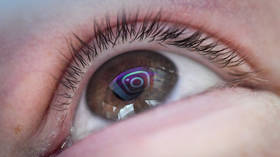With ‘likes’ gone from Instagram, how will all those social media ‘influencers’ cope?
Danielle Ryan is an Irish freelance writer based in Dublin. Her work has appeared in Salon, The Nation, Rethinking Russia, teleSUR, RBTH, The Calvert Journal and others. Follow her on Twitter @DanielleRyanJ
Published time: 18 Jul, 2019 20:40Edited time: 19 Jul, 2019 14:05

Instagram has done the unthinkable and hidden the number of ‘likes’ on posts. The goal is to “remove the pressure” from users and make them worry less about popularity — but will it be a deathblow to the ‘influencer’ generation?
If you’re an Instagram fanatic, don’t freak out yet. The new hidden-likes feature is currently only being tested in a few countries, so you might be safe — for now.
For the uninitiated, “influencers” are people who managed to amass a huge social media following and subsequently catch the eye of brands who then pay them to take pictures wearing, eating or using their products in order to “influence” those followers into being just like them (otherwise known as marketing).
Some “influencers” are already famous (think the Kardashians) and some are just regular people who earn lots of money taking carefully-staged photos of themselves in various states of undress while advertising some product or other.
What are they going to do if one of their main currencies — their likes — suddenly disappears? How will everyone know how cool they are? While it might be nice to imagine that a like-free Instagram would spell the end of the influencers, it’s unlikely. They will still be able to use third-party metric platforms to prove their impressive like numbers — and they will likely begin to use other metrics to prove their worth to brands: some influencers have already started begging their followers to leave a comment instead.
Data recently showed that even "nano-influencers" (people with follower counts between 500-5,000) can earn $100 per image post, while "power influencers”(who boast between 30,000-50,000 followers) can earn more than $500 for an image post and nearly $800 for a video post. Over 500,000 followers and you're considered a “celebrity influencer,” raking in thousands of dollars for each post.
ALSO ON RT.COMHands off my likes! Russian blogger sues Instagram over move to make ‘likes’ private
I’ve always said if I could only keep one social media account alive, I’d keep Instagram — despite the fact that I have far more followers on Twitter. Instagram is a happier place, full of smile-inducing images of dogs, sunsets and other nice things — my social media zen, if there could be such a thing.
Yet my Instagram experience is clearly vastly different from that of many other people. There are, lest we forget, people who literally live for likes. Earlier this year, one influencer in the US had a complete meltdown after her Instagram account was suddenly deleted. She wailed into the camera about how she is not one of those “90 per-centers” who works a nine-to-five job. “I am nothing without my following,” she spluttered through tears, making the whole thing seem an uncomfortable combination of truly pathetic and a little bit sad.
Instinctively, Instagram’s move to hide likes felt to me like more coddling of the perpetually offended crowds who lurk on social media waiting for any opportunity they can demand somebody, somewhere take some “action” to make them feel better.
Perhaps, I thought, other people’s higher like counts are offending them and Instagram has decided to act to protect their sensibilities. It would hardly be surprising; Apple just introduced 75 new emoji combinations so that every human relationship combination imaginable will be represented and no one on earth could ever again feel left out of emoji land. Phew!
Instagram says it wants users to “focus on sharing the things you love” rather than obsess over how many likes a post receives — and while one should be eternally skeptical of any social media platform (especially one owned by Facebook) doing something out of pure concern for users, it is undoubtedly true that social media can have a serious effect on young people’s mental health.
Younger generations online have never experienced a life without likes. To many of them, likes and self-worth are inextricably linked — and each red heart is just one more sliver of validation. Kids are taking hundreds of selfies a day, tweaking them and editing them endlessly, applying filters, buying fake followers and deleting posts that don’t get enough likes.
It's not clear how long Instagram will be running the hidden likes trial or how it will even measure the impact of its success or failure, but the need for validation is so entrenched that it’s hard to believe simply removing likes is going to fix that sickness in society.
If it’s not Instagram likes, it’ll be something else.
The statements, views and opinions expressed in this column are solely those of the author and do not necessarily represent those of RT.









0 Comments:
Post a Comment
Subscribe to Post Comments [Atom]
<< Home